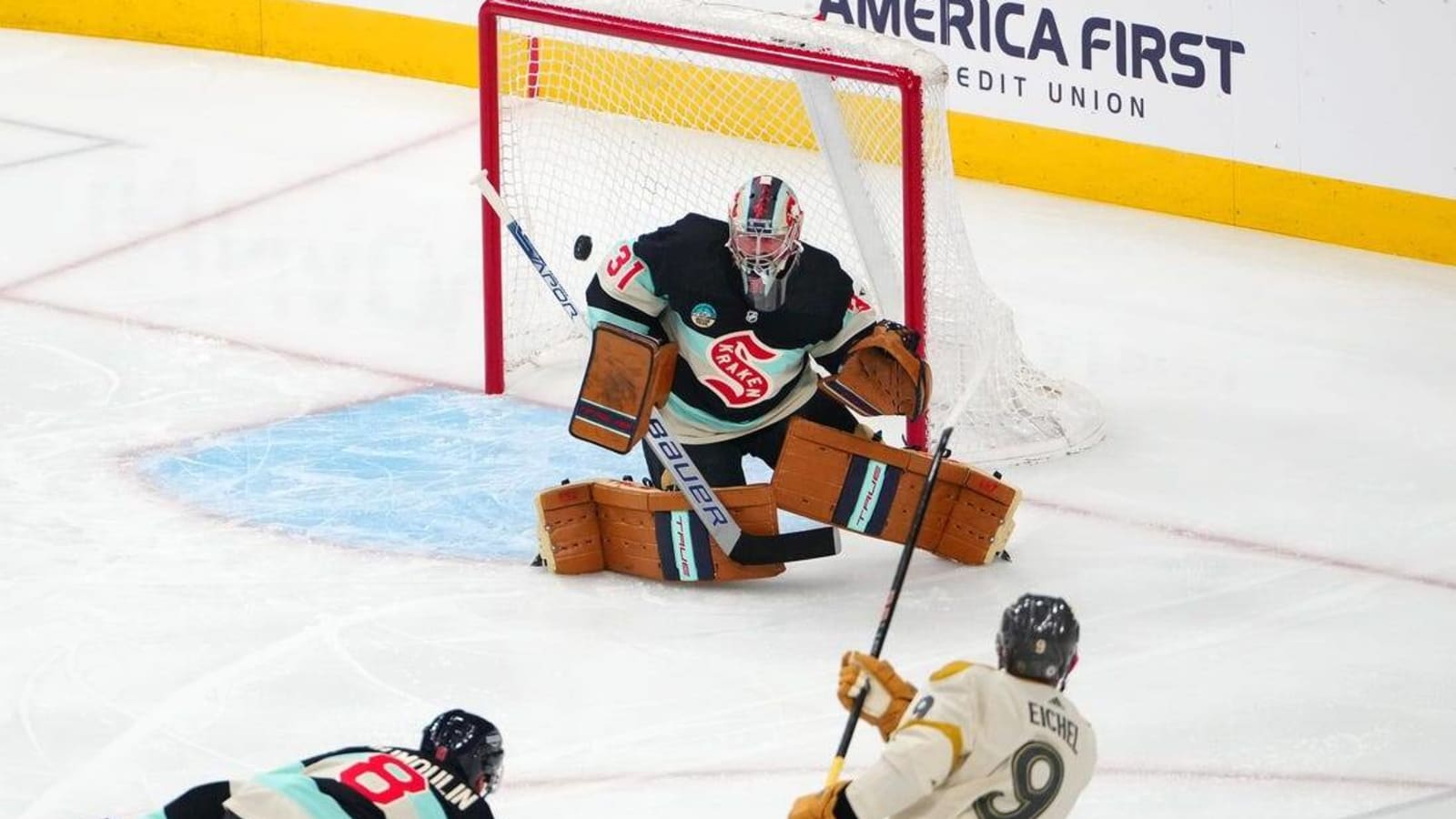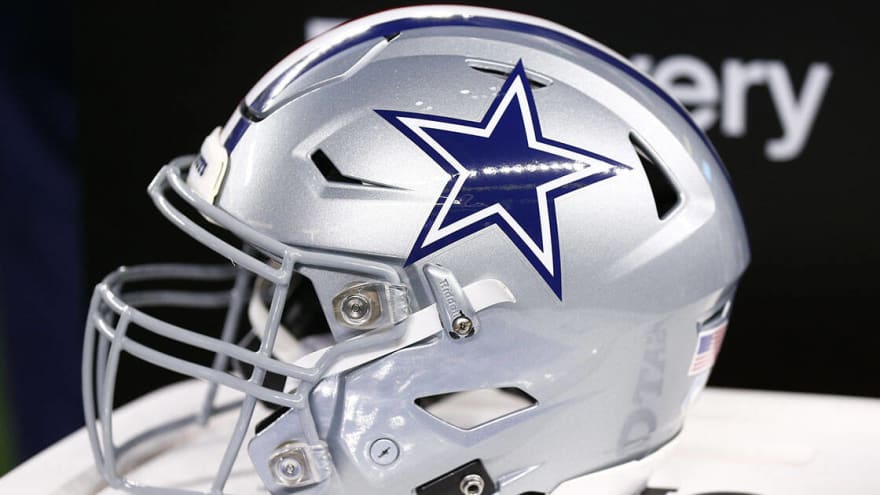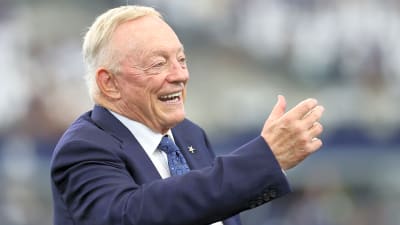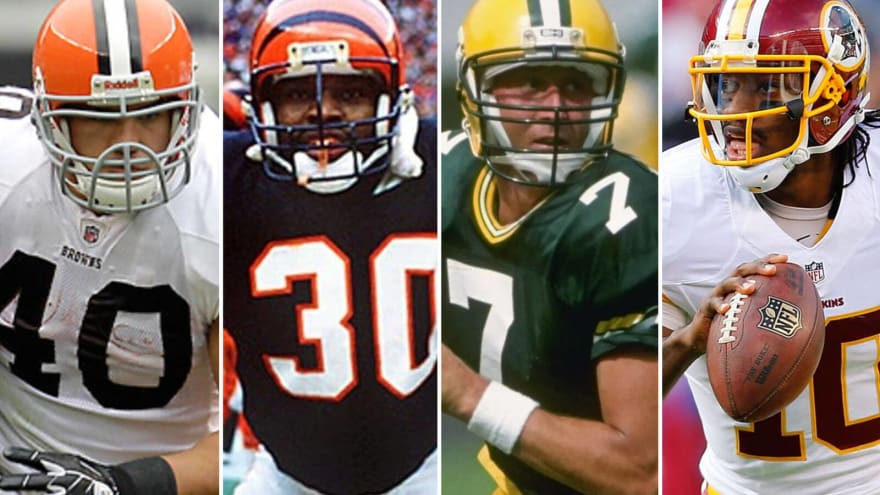
Keegan Kolesar scored the game-winner on a rebound with 1:20 remaining as the Vegas Golden Knights edged the Seattle Kraken 3-1 on Thursday night in Las Vegas.
Brett Howden set up Kolesar's goal with a rush down the left wing and a shot that caromed to Kolesar on the right side of the crease. Kolesar then scooped the puck into the net for his sixth goal of the season.
Chandler Stephenson sealed the win with an empty-netter with 10.5 seconds left and Jack Eichel also scored for Vegas, which moved to within two points of Los Angeles for third place in the Pacific Division. The Golden Knights also increased their wild-card lead to four points over St. Louis.
Logan Thompson finished with 20 saves and Brayden McNabb added a pair of assists for Vegas, which won for just the third time in its last nine home games.
Jaden Schwartz scored and Philipp Grubauer made 34 saves for Seattle, which lost its sixth straight game (0-5-1).
Vegas took a 1-0 lead at the 8:14 mark of the first period on Eichel's 22nd goal of the season. Jonathan Marchessault set the score up with a pass from behind the net into the crease, where Eichel jammed the puck inside the right post. It was his third goal and ninth point over the last six games.
The Kraken, held to just two shots on goal over the first 13 minutes of the third period, tied it 1-1 with 6:31 left on a power-play goal. Schwartz deflected a right point shot by Ryker Evans past Thompson -- his 12th goal and first since Feb. 19.
Seattle nearly took the lead 90 seconds later, but Eeli Tolvanen's spinning wrist shot from the slot ricocheted off the right post.
Kolesar then scored the go-ahead goal, which was unsuccessfully challenged by the Kraken for being offsides.
More must-reads:
- Canucks believed to have inquired about Predators' Steven Stamkos
- Baseball Hall of Fame announces eight names on Era Committee ballot
- The 'NFL Passing YPG leaders' quiz
Breaking News
Trending News
TODAY'S BEST

Insider Sees Ducks Making a Play for Rangers Superstar
The Anaheim Ducks may be an unexpected player in the Artemi Panarin sweepstakes, according to NHL insider Elliotte Friedman, who suggested on the latest 32 Thoughts podcast that Anaheim could be a potential fit if the star forward hits the market. Panarin, a pending unrestricted free agent, has yet to reach an agreement on a new contract with the New York Rangers, and Friedman noted that while the veteran winger prefers to stay in New York, there’s growing curiosity around what might happen if talks stall. “I was kind of wondering if a guy like Panarin might make some sense there,” Friedman said, referencing Ducks general manager Pat Verbeek, who has earned a reputation for taking “big swings” in his short tenure. The Ducks, currently built around a deep pool of young talent that includes Mason McTavish, Jackson LaCombe, Leo Carlsson, and Troy Terry, could see Panarin as the elite veteran piece to accelerate their transition from rebuild to contention. Friedman also pointed out the connection between Panarin and Joel Quenneville, who coached him during his breakout rookie season in Chicago. How much those two are still linked is anyone’s guess, but it could be a potential storyline to watch if Quenneville makes it known that he’s interested. Panarin to the Ducks Is Little More Than a Theory While a deal remains purely speculative, and Friedman wasn’t saying he’s heard rumblings of any trade or interest from either side, the idea of Anaheim pursuing a short-term, high-impact scorer like Panarin would be fascinating. It would signal a dramatic shift in their competitive timeline. First things first, the Rangers need to decide what they’re doing with their star forward. Once his future with the team is determined, only then could Verbeek even begin preparing to take one more “big swing” in Anaheim.

Matt LaFleur spills the beans on what the Packers really plan to do ahead of the NFL trade deadline
The Green Bay Packers don't tend to be the most active team ahead of trade deadlines. Since general manager Brian Gutekunst took over in 2018, he's never acquired a player in the week leading up to the deadline — on the other hand, he's sold Ha Ha Clinton-Dix, Ty Montgomery, Rasul Douglas, and Preston Smith. However, Gutekunst did consider some trades — most notably, wide receiver Will Fuller back in 2020. Ultimately, the price requested by the Houston Texans wasn't right. This is mostly how the Packers will process things ahead of Tuesday's deadline. The roster is good enough The Packers already made two trades right before the season, acquiring Micah Parsons and Darian Kinnard. Asked about potential moves on Monday, head coach Matt LaFleur mentioned that the team doesn't need to add more players to be competitive, but the front office is making sure to evaluate opportunities. "I don't think so, not necessarily," LaFleur said about the need to add pieces. "I know Gutey and the rest of the guys upstairs are doing a great job of looking for things that could potentially help us, and if the right decision is there, I’ve got full confidence he’ll make it." Gutekunst and LaFleur have a close relationship, and the big roster decisions go through both of them, even though the GM has the final call. "We're in constant communication about everything," LaFleur added. While cornerback and defensive tackle were arguably the biggest needs on the roster, the tight end room also became thin with Tucker Kraft's season-ending knee injury. Right now, the only two TEs on the roster are Luke Musgrave and John FitzPatrick — Josh Whyle is on the practice squad and could be promoted or elevated. The trade deadline is at 3 p.m. (CT) on Tuesday, Nov. 4. Don't expect big moves from the Packers, but something might happen — and as always, only if the price is right. This article was originally published on A to Z Sports Green Bay, as "Matt LaFleur spills the beans on what the Packers really plan to do ahead of the NFL trade deadline."

Dolphins' Mike McDaniel Reveals Tua Tagovailoa Decision Before Bills Game
Through nine weeks of the NFL season, the Miami Dolphins have been one of the worst teams in the league. Following the team's 28-6 Week 9 loss to the Baltimore Ravens on Thursday night, the Dolphins have fallen to 2-7 on the year, and have seemingly already laid the groundwork for a total rebuild. One day after the loss, the Dolphins announced that they had fired general manager Chris Grier. A change in power at the GM role indicates that no one on the roster is safe moving forward, as whoever is brought in will have ties or allegiances with the current regime. One person who many believed could be at risk of losing his job is quarterback Tua Tagovailoa. The Pro Bowl quarterback has been a shell of his former self this season, throwing for 1,779 yards with 15 touchdowns and 11 picks through nine games. For reference, Tagovailoa's previous career high in interceptions came in 2023, when he threw 14 in 17 games. Head coach Mike McDaniel benched Tagovailoa in the team's Oct. 19 loss to the Cleveland Browns after he threw three interceptions and lost a fumble, turning to rookie quarterback Quinn Ewers. While calls have been growing again for Tagovailoa to be sent to the bench once and for all, McDaniel confirmed that he's not entertaining that idea at this time. When speaking to the media on Monday ahead of the team's Week 10 game against the Buffalo Bills (6-2), McDaniels confirmed he is not anywhere close to making that decision at this time. "I am far from even going down that direction of would've, could've possible things," McDaniel said. "We have a football game against the Buffalo Bills that we are certain that Tua gives us the best chance to win and we have to approach our jobs with diligence. We have to execute and Tua knows that heavy is crown that of being a franchise quarterback." According to ESPN BET, the Bills have opened as 8.5-point favorites. While Miami looks to stay afloat on the season, the Bills are coming off of a monster win over Patrick Mahomes and the Kansas City Chiefs, as they look to make a Super Bowl run this season. As for the Dolphins, they haven't beaten the Bills since 2022, and are 1-9 against them in their last 10. Tagovailoa has been far from spectacular this season, but is clearly being given some grace by McDaniel. With that being said, the Dolphins have a bye in a couple of weeks, and it does cause one to wonder if that is when the Dolphins would end up benching the former Alabama star if things don't turn around.

Dallas Cowboys vs. Arizona Cardinals: Inactives for Week 9 matchup
The Dallas Cowboys (3-4-1) have released their inactives for the Week 9 matchup against the Arizona Cardinals (2-5). Dallas will be missing a few key players and shared the final update on a key offensive lineman. Ahead of the Monday night contest, the Cowboys activated center Cooper Beebe off the reserve/injured-designated to return list. Beebe was listed as questionable for the game and has not played since suffering an ankle injury in Week 2 against the New York Giants. Another injury move the Cowboys made on Monday was placing linebacker Jack Sanborn on injured reserve. He suffered a concussion in Week 5 against the New York Jets and had a groin injury in the game against the Denver Broncos last week. With Sanborn being placed on injured reserve, the Cowboys elevated running back Malik Davis from the practice squad to the active roster. Additionally, Dallas elevated DB Zion Childress and TE Princeton Fant from the practice squad for Monday night’s game against the Cardinals. The Cowboys might be dealing with injuries, but they are in need of wins since they are on the outside looking in when it comes the playoffs. Cowboys wide receiver CeeDee Lamb believes the Cowboys can turn things around with a win against the Cardinals. “As for us, as a team, I know we all have the same mind. We’re all very understanding of what’s going on, and the situation that we’re in. We’re putting ourselves in it,” Lamb said, per Mickey Spagnola of Dallas Cowboys.com. “So urgency, nah, it’s always been there to win a couple of games back-to-back and continue on that road. … But I feel we haven’t done that yet. I feel if we start here this weekend on Monday night with a win, bye week, then come off the bye week ready to roll.” Dallas Cowboys Week 9 inactives S Alijah Clark RB Jaydon Blue DT Mazi Smith S Donovan Wilson OL Ajani Cornelius WR Jonathan Mingo OL Hakeem Adeniji Arizona Cardinals Week 9 inactives QB Kyler Murray CB Elijah Jones LB Xavier Thomas OL Demontrey Jacobs OL Josh Fryar DL Bilal Nichols
Customize Your Newsletter
 +
+
Get the latest news and rumors, customized to your favorite sports and teams. Emailed daily. Always free!






























